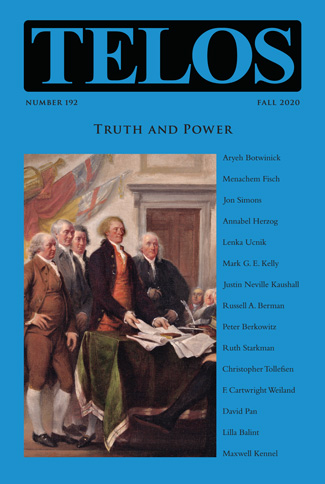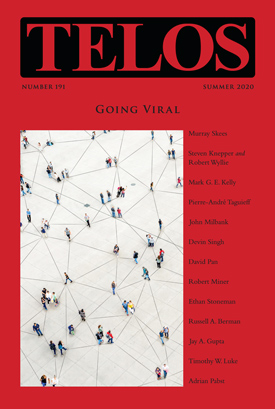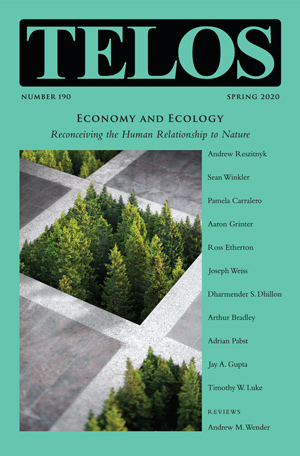By Bruno Retailleau · Tuesday, January 26, 2021 These remarks were published in Le Figaro on January 8, 2021, and appear here with permission of the author. Translated by Russell A. Berman. Footnotes have been added for clarification by the translator, whose introductory comments are here.
In a democracy, liberty always goes hand in hand with responsibility. Donald Trump’s responsibility for the outbreak of violence on Capitol Hill is clear. Minimizing that responsibility, as Marine Le Pen did by asserting that the American president did not “gauge the impact of his words” is the false politics: Because it ignores that in our agitated democracies, facing an exhausted people, moderating one’s words constitutes the premier obligation of responsible politicians. It is more than a matter of civility; it is an urgent civic necessity, if we do not want to see the battle of tweets degenerate into a war of all against all.
Yet indignation is not enough. We also have to understand. What do we see on the other side of the Atlantic? An ailing democracy, to be sure. Ailing from an epidemic of anger, of which the violence at the Capitol was by no means the first wave, nor is America the only “cluster” of this epidemic, since it has already spread across the rest of the Western world.
Continue reading →
By Norbert Bolz · Friday, October 30, 2020 There are conspiracies. Many learned of Catiline, the ideal type of a conspirator, in Latin lessons. But even the memory of Richard Nixon in the Watergate affair suffices. The secret agreements by the powerful in back rooms, the hidden workings of the intelligence services, and all forms of secret diplomacy stir in us the suspicion of conspiracy.
As a general rule, we only have knowledge of failed conspiracies. And their failure, as once noted by Machiavelli in his Discorsi, is highly probable, for when more than a handful of people conspire to commit a crime, the danger posed by whistleblowers grows exponentially. Yet it does not naturally follow that conspiracies cannot succeed. We just know nothing about them. The perfect conspiracy remains just as invisible as the perfect murder.
Continue reading →
By David Pan · Friday, September 25, 2020 Telos 192 (Fall 2020): Truth and Power is now available for purchase in our store. Individual subscriptions to Telos are also available in both print and online formats.
 There is a strong temptation to oppose the idealism of truth to the realism of power in order to criticize and turn away from politics as a base pursuit. Science, facts, and ideals are cited as the objective truths that so often are ignored in favor of ideology, lies, and self-interest by those who wield power. Yet this opposition between truth and power can itself become a dubious tactic, as it is often the speaker who seeks to define an opinion as truth. This situation is complicated by the circumstance that there are three forms of truth that are often merged in such discussions. There is a strong temptation to oppose the idealism of truth to the realism of power in order to criticize and turn away from politics as a base pursuit. Science, facts, and ideals are cited as the objective truths that so often are ignored in favor of ideology, lies, and self-interest by those who wield power. Yet this opposition between truth and power can itself become a dubious tactic, as it is often the speaker who seeks to define an opinion as truth. This situation is complicated by the circumstance that there are three forms of truth that are often merged in such discussions.
First, there are natural scientific truths that even autocrats and totalitarians do not seek to deny, as they are the source of the technological tools that can support any attempt to maintain power. Here, there is certainly no conflict between truth and power. Not only does political power depend on technological achievement, but natural scientific facts cannot be covered up by lies and ideology for long. Consequently, political actors must pay attention to natural scientific and technical knowledge, even if they then instrumentalize it in different ways.
Continue reading →
By Norbert Bolz · Thursday, September 17, 2020 Worse than the concrete fear of some life-threatening reality, such as in the past the Spanish flu or today COVID-19, is the anxiety nourished by the imagination of terror. This is the business of the modern prophets of the apocalypse, who usually show up in the guise of science. They lend support to the great religion-substitute of an infinite environmentalist worry, with which the Party of Prohibitions exploits the guilty conscience of an affluent society. Instead of “What can I hope for?”—a question for which one used to expect an answer from Christianity—they ask: “What must I fear?” This accords to the presumed wisdom of children who want to carry out a world tribunal to save the earth.
Continue reading →
By Russell A. Berman · Wednesday, June 17, 2020 The following essay is part of a group of responses to the COVID-19 pandemic that appear in Telos 191 (Summer 2020): Going Viral, which is now available for purchase in our store. Individual subscriptions to Telos are also available in both print and online formats.
 As of this writing, the precise origin of the Chinese virus, SARS CoV-2, remains unclear. It is however known that cases predated the eruption in the “wet market” in Wuhan—which in the meantime has been reopened, suggesting at least that Chinese authorities do not believe it was the source of the pandemic. The alternative theory that the virus escaped from experiments in one of Wuhan’s virology laboratories therefore remains plausible. In any case, it is certain that Wuhan was the first epicenter and that state authorities used repressive power to delay alerting the world by possibly more than a month. With that additional time, the spread of the disease might have been contained, or its dissemination at least impeded, if China and the World Health Organization had acted with transparency and integrity. They did not. As of this writing, the precise origin of the Chinese virus, SARS CoV-2, remains unclear. It is however known that cases predated the eruption in the “wet market” in Wuhan—which in the meantime has been reopened, suggesting at least that Chinese authorities do not believe it was the source of the pandemic. The alternative theory that the virus escaped from experiments in one of Wuhan’s virology laboratories therefore remains plausible. In any case, it is certain that Wuhan was the first epicenter and that state authorities used repressive power to delay alerting the world by possibly more than a month. With that additional time, the spread of the disease might have been contained, or its dissemination at least impeded, if China and the World Health Organization had acted with transparency and integrity. They did not.
Continue reading →
By Pamela Carralero · Friday, June 12, 2020 Pamela Carralero’s “Scientific Modeling and the Environment: Toward the Establishment of Michel Serres’s Natural Contract” appears in Telos 190 (Spring 2020): Economy and Ecology: Reconceiving the Human Relationship to Nature. Read the full article at the Telos Online website, or purchase a print copy of the issue in our online store. Individual subscriptions to Telos are available in both print and online formats.
 In the sciences, the hypotheses driving the exploration of the natural world are often investigated via analogical transfer, meaning that the crux of scientific activity resides in the use and interpretation of models as tools that facilitate an accurate description of natural laws. The exact status of the model’s role and its lasting importance, however, remains a controversial topic among scientists and philosophers. For some, the model is a way of reaching a conclusive theorem or systematic statement; for others, including French philosopher Michel Serres, the model is a multifaceted space of translation that asks its interpreters to meditate on the inaccessible nature of what it makes accessible via ideogrammatic transcription. In the sciences, the hypotheses driving the exploration of the natural world are often investigated via analogical transfer, meaning that the crux of scientific activity resides in the use and interpretation of models as tools that facilitate an accurate description of natural laws. The exact status of the model’s role and its lasting importance, however, remains a controversial topic among scientists and philosophers. For some, the model is a way of reaching a conclusive theorem or systematic statement; for others, including French philosopher Michel Serres, the model is a multifaceted space of translation that asks its interpreters to meditate on the inaccessible nature of what it makes accessible via ideogrammatic transcription.
Placing Serres in conversation with Bruno Latour and Jacques Rancière, this article argues that Serres provides the tools to theorize models as mediums through which to acknowledge and interact with the environment as that which is innately inaccessible to human knowledge. This is a first step toward establishing what he calls a “natural contract,” a union of life-giving reciprocity between humans and nonhumans that offers new conceptualizations of knowledge and science as practices free from the totalizing codifications of human verdicts. More specifically, this article imagines models as gateways between the inaccessible and accessible, arguing their value as a setting for the construction and play of scientific interpretations. It concludes by examining the relationship between modern climate models and the inaccessible in order to propose a techno-scientific, intra-temporal mentality of uncertainty from which a natural contract can develop.
Continue reading →
|
|










